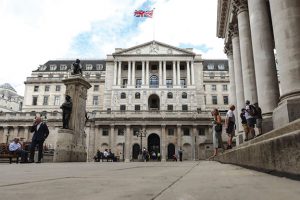Bloomberg
The Bank of England is likely to keep interest rates in painful territory through this year or longer even as the economy falls into recession.
Inflation is running five times above the BOE’s target, and Governor Andrew Bailey is concerned that worker shortages are feeding wage pressures. The market is betting on another 1 point increase in the benchmark lending rate this year and has walked back bets for a reduction thereafter.
That’s in sharp contrast with the US, where investors anticipate the Federal Reserve to deliver the first cuts in borrowing costs since the start of the pandemic as soon as November.
“The BOE is going to have to keep bearing down on inflation for quite a long time,†said Robert Wood, chief UK economist at Bank of America. He said the UK “stands out†as having the worst of problems in the US and Europe, adding that underlying price pressures and strong pay growth mean “this inflation is going to last.â€
The latest economic data reported this week showed wage pressures at record levels, except for the period directly after the pandemic. Inflation ticked down for a second month to 10.5%. Bailey said he hoped a corner has been turned on inflation, but he also noted the scarcity of workers is leading to pay raises that may feed into higher prices.
The result means the quickest monetary tightening cycle in three decades has further to run. Markets have almost fully priced in a half-point increase from the BOE in February to 4%, the highest since 2008, and then another half point by the third quarter. In the US, investors see the Federal Reserve reversing some of its increases in the second half of the year.
For British households, that means more pain. Families are already struggling with the tightest cost-of-living squeeze in a generation and wages falling short of inflation. The central bank has warned that 4 million households will have to remortgage this year at significantly higher rates — adding hundreds of pounds to monthly repayments.
Those factors solidify forecasts that the economy will struggle to grow before 2024. While the rest of the Group of Seven nations have recovered pre-pandemic levels of output and are planning for growth, albeit sputtering at times, the UK is headed into a long but shallow recession. That’s adding to pressure on Prime Minister Rishi Sunak to come up with a growth plan.
Some strategists believe divisions on the nine-member Monetary Policy Committee could even force the BOE to return with more rate hikes after a pause in its tightening cycle expected later this year.
The majority of the MPC backed a half-point increase last month. But Silvana Tenreyro and Swati Dhingra are pushing for no change while Catherine Mann wanted bigger hikes. Chief Economist Huw Pill has said the UK has the worst features of both the US and European Union economies — a high level of workforce dropouts and an energy supply crisis.
 The Gulf Time Newspaper One of the finest business newspapers in the UAE brought to you by our professional writers and editors.
The Gulf Time Newspaper One of the finest business newspapers in the UAE brought to you by our professional writers and editors.
